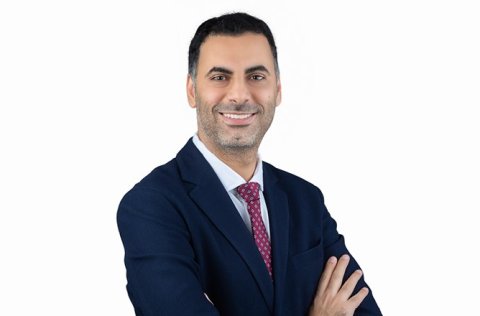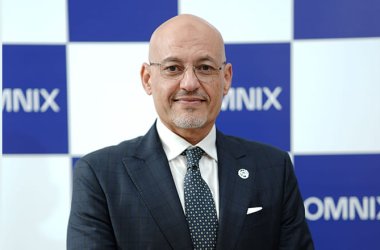CNME Editor Mark Forker spoke to Ahmed Ibrahim, Director, Global Business Development – Service Providers at Intel, to find out how the company is committed to using AI responsibly, the importance of regulation – and its aspirations to be a global leader when it comes to sustainability.
Ahmed Ibrahim has enjoyed a distinguished career in IT and telecommunications over the last 20 years – and is one of the most respected thought leaders in his field.
Ibrahim has excelled at Intel, and now holds a global position with the US technology behemoth.
In a brilliantly forthright exchange with CNME, Ibrahim started the conversation by highlighting the incredible potential of AI technology.
“AI is the fastest growing compute workload with an incredible potential to enhance the way we live, work and play. However, in order to capitalise on this opportunity, we have to leverage AI in a responsible way. OpenAI and generative ChatGPT have exploded onto the scene, but its popularity has left many people wondering is it another technology fad, or is it here to stay? I think its success depends on the accuracy of the data models and if the innovation is pursued responsibly,” said Ibrahim.
Ibrahim said Intel plays an important role in AI developments from a chip design and manufacturing perspective.
He stressed how Intel was fully committed to using AI ethically and responsibly.
“We also play an important role in generating the compute power needed to support AI workloads. There can be huge challenges in the lifecycle of a new product in the development phase, such as the unintended biases that are baked into certain algorithms that lead to a series of unwanted outcomes. Intel has been recognised globally for being one of the most ethical companies in the world. Intel also acknowledges the importance of the choices we make when pursuing new AI developments and technologies. There are so many companies across multiple industries that are making significant breakthroughs in AI that are leveraging Intel chipsets, so we have to apply AI responsibly,” said Ibrahim.
Ibrahim also highlighted the need to protect human rights when it comes to AI.
“Human rights are embedded in our values and applies everywhere we do business. We have a set of global Intel principles that formalise our commitment to human rights, and we are trying to incorporate this in our products and design principles across our entire portfolio. We are committed to advancing AI responsibly, and we do this by making sure we establish robust guidelines and principles throughout the development of the products lifecycle to reduce the biases that emerge. In addition to this, we collaborate with industry partners to mitigate any harm that could potentially be done from the use of AI,” said Ibrahim.
It is accepted in the industry that with every new technology it takes time to be adopted, but with AI, there are many that fear it could have a negative impact on society.
Ibrahim believes that AI needs strong regulation.
I think with every new technology there is a fear in terms of how do we use this technology properly? Regulations are critically important when it comes to new disruptive and transformative technologies. If you examine technologies like Wi-Fi or 5G, you can see that they both have strong regulation and governance. The problem comes when you don’t have regulations and rules and people deploy the technology and take it in a direction that best suits their business model. Once you create different islands of AI technology then it’s going to be incredibly difficult to regulate it because the AI deployment is fragmented between different locations, so interoperability will take a considerable amount of time. The primary role of the regulator is to be in control when it comes to setting the standards and making these standards open and all of the technology vendors comply with these technology standards,” said Ibrahim.
Ibrahim added that Intel is very committed to the open-source community – and regularly engages with them to provide feedback on how they can improve the entire ecosystem.
Before moving away from the topic of AI, Ibrahim pointed out that the four pillars of their responsible AI program is external/internal governance, research, collaboration and inclusive AI.
“I think our internal/external governance is so important, and that really drives our conversations and dialogue with the open-source community to create a universal framework that can help us achieve the openness that all stakeholders want – and to ensure that nobody is misusing an AI solution, or dictating that it can’t be used by others,” said Ibrahim.
COP28 is being held in Abu Dhabi later this year.
Due to the fact that the IT industry is one of the most energy intensive in the world, there is growing pressure on IT leaders such as Intel to reduce their carbon footprint.
Ibrahim declared that Intel was fully committed to addressing climate change.
“Sustainability is undoubtedly one of the key areas of focus for all governments and businesses across the Middle East. You can see that all of the Gulf countries are looking to move away from an oil-based economy to a data-based economy. To move to a data-based economy then it’s important to have a strong lens on sustainability. We know that climate change is a serious environmental, economic and social challenge. Intel is 100% committed to addressing climate change through our manufacturing, supply chain and products. We have aspirations to achieve net zero greenhouse gas emissions in our global operations by 2040. We also have plans to drive reductions in supply chain emissions and the carbon used in our products. This is part of Intel’s RISE strategy, which stands for responsible, inclusive, sustainable and enabled. Intel has had a longstanding commitment to sustainability and we want to include our customers, partners and suppliers with us on this sustainability journey,” said Ibrahim.
He added that their sustainability vision was built on three key pillars.
“Our sustainability vision is built mainly through three main pillars, which is sustainability by design in our products, platforms, software and services, the second pillar is to reduce our footprint by working with sustainable suppliers, manufacturers and distributors. The third pillar is all about driving open innovation to enable others to meet sustainability goals,” said Ibrahim.
Ibrahim then explained the dynamic of his own global role at Intel.
“There are a lot of verticals that Intel covers and one of them is with telecommunication providers. I am responsible for the business development relationship between Intel and telecommunication providers globally. I work closely with tier 1 telco global telco operators. We work with them on thought leadership in an effort to let them know what is coming next in the industry. By informing them of how the telco industry is changing we can leverage our knowledge and expertise to help them access some of the latest and greatest technology being developed by Intel. Our customers always look at us as a trusted advisor,” said Ibrahim.
He concluded a great conversation by highlighting some of the key focus areas of technology that operators will be looking at.
“There is a lot happening with telco cloud and Open-RAN, and it’s my job to help them capitalise on all the new opportunities that are emerging. Intel is a big advocate of virtualisation within the telco industry since 2012, and we’re pushing for sustainability to be included in our RAN products too. It’s an exciting time for the IT industry globally, and like always, Intel will be at the forefront of innovation and development across all the key industry verticals,” said Ibrahim.





